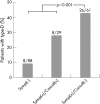Failure to consult for symptoms of heart failure in patients with a type-D personality
- PMID: 17344329
- PMCID: PMC1994460
- DOI: 10.1136/hrt.2006.102822
Failure to consult for symptoms of heart failure in patients with a type-D personality
Abstract
Background: Self-management and adequate consultation behaviour are essential for the successful treatment of chronic heart failure (CHF). Patients with a type-D personality, characterised by high social inhibition and negative affectivity, may delay medical consultation despite increased symptom levels and may be at an increased risk for adverse clinical outcomes.
Aim: To examine whether type-D personality predicts poor self-management and failure to consult for evident cardiac symptoms in patients with CHF. Design/methods/
Patients: 178 outpatients with CHF (aged < or =80 years) completed the type-D Personality Scale at baseline, and the Health Complaints Scale (symptoms) and European Heart Failure Self-care Behaviour Scale (self-management) at 2 months of follow-up. Medical information was obtained from the patients' medical records.
Results: At follow-up, patients with a type-D personality experienced more cardiac symptoms (OR 6.4; 95% CI 2.5 to 16.3, p<0.001) and more often appraised these symptoms as worrisome (OR 2.9; 95% CI 1.3 to 6.6, p<0.01) compared with patients with a non-type-D personality. Paradoxically, patients with a type-D personality were less likely to report these symptoms to their cardiologist/nurse, as indicated by an increased risk for inadequate consultation behaviour (OR 2.7; 95% CI 1.2 to 6.0, p<0.05), adjusting for demographics, CHF severity/aetiology, time since diagnosis and medication. Accordingly, of 61 patients with CHF who failed to consult for evident cardiac symptoms, 43% had a type-D personality (n = 26). Of the remaining 108 patients with CHF, only 14% (n = 16) had a type-D personality.
Conclusion: Patients with CHF with a type-D personality display inadequate self-management. Failure to consult for increased symptom levels may partially explain the adverse effect of type-D personality on cardiac prognosis.
Conflict of interest statement
Competing interests: None declared.
Comment in
-
Personality and heart disease.Heart. 2007 Jul;93(7):783-4. doi: 10.1136/hrt.2006.109355. Heart. 2007. PMID: 17569802 Free PMC article.
Similar articles
-
Type D personality and cardiac mortality in patients with chronic heart failure.Int J Cardiol. 2010 Jul 23;142(3):230-5. doi: 10.1016/j.ijcard.2008.12.090. Epub 2009 Jan 21. Int J Cardiol. 2010. PMID: 19162343
-
Health status in patients treated with cardiac resynchronization therapy: modulating effects of personality.Pacing Clin Electrophysiol. 2008 Jan;31(1):28-37. doi: 10.1111/j.1540-8159.2007.00922.x. Pacing Clin Electrophysiol. 2008. PMID: 18181907
-
Type-D personality but not depression predicts severity of anxiety in heart failure patients at 1-year follow-up.J Affect Disord. 2008 Feb;106(1-2):73-81. doi: 10.1016/j.jad.2007.05.021. Epub 2007 Jul 5. J Affect Disord. 2008. PMID: 17614136
-
[The German National Disease Management Guideline "Chronic Heart Failure"].Dtsch Med Wochenschr. 2012 Feb;137(5):219-27. doi: 10.1055/s-0031-1292894. Epub 2012 Jan 25. Dtsch Med Wochenschr. 2012. PMID: 22278695 Review. German.
-
Tailoring consumer resources to enhance self-care in chronic heart failure.Aust Crit Care. 2009 Aug;22(3):133-40. doi: 10.1016/j.aucc.2009.05.003. Epub 2009 Jul 5. Aust Crit Care. 2009. PMID: 19581110 Review.
Cited by
-
Symptoms of Dry Eye Disease and Personality Traits.PLoS One. 2016 Nov 18;11(11):e0166838. doi: 10.1371/journal.pone.0166838. eCollection 2016. PLoS One. 2016. PMID: 27861642 Free PMC article.
-
Determinants of heart failure self-care: a systematic literature review.Heart Fail Rev. 2012 May;17(3):367-85. doi: 10.1007/s10741-011-9292-9. Heart Fail Rev. 2012. PMID: 22134397
-
Type D Personality, Concomitant Depressive and Anxiety Disorders, and Treatment Outcomes in Somatic Symptom and Related Disorders: An Observational Longitudinal Cohort Study.Front Psychiatry. 2019 Jun 19;10:417. doi: 10.3389/fpsyt.2019.00417. eCollection 2019. Front Psychiatry. 2019. PMID: 31316400 Free PMC article.
-
Type D personality is a risk factor for psychosomatic symptoms and musculoskeletal pain among adolescents: a cross-sectional study of a large population-based cohort of Swedish adolescents.BMC Pediatr. 2013 Jan 21;13:11. doi: 10.1186/1471-2431-13-11. BMC Pediatr. 2013. PMID: 23336535 Free PMC article.
-
Patients who take their symptoms less seriously are more likely to have colorectal cancer.BMC Gastroenterol. 2012 Sep 22;12:130. doi: 10.1186/1471-230X-12-130. BMC Gastroenterol. 2012. PMID: 22998324 Free PMC article.
References
-
- Newman S, Steed L, Mulligan K. Self‐management interventions for chronic illness. Lancet 20043641523–1537. - PubMed
-
- Krum H. The task force for the diagnosis and treatment of chronic heart failure of the European Society of Cardiology. Guidelines for the diagnosis and treatment of chronic heart failure (update 2005). Eur Heart J 2005262472–2477. - PubMed
-
- American Heart Association Heart disease and stroke statistics—2005 update. Dallas, TX: American Heart Association, 2004
Publication types
MeSH terms
LinkOut - more resources
Full Text Sources
Medical

